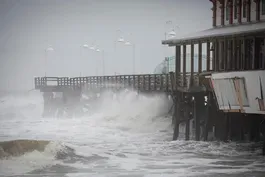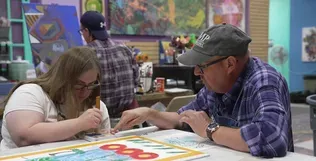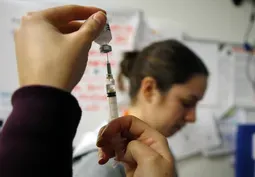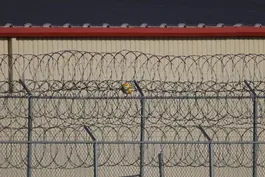
May 3, 2025 - PBS News Weekend full episode
5/3/2025 | 26m 44sVideo has Closed Captions
May 3, 2025 - PBS News Weekend full episode
May 3, 2025 - PBS News Weekend full episode
Problems with Closed Captions? Closed Captioning Feedback
Problems with Closed Captions? Closed Captioning Feedback
Major corporate funding for the PBS News Hour is provided by BDO, BNSF, Consumer Cellular, American Cruise Lines, and Raymond James. Funding for the PBS NewsHour Weekend is provided by...

May 3, 2025 - PBS News Weekend full episode
5/3/2025 | 26m 44sVideo has Closed Captions
May 3, 2025 - PBS News Weekend full episode
Problems with Closed Captions? Closed Captioning Feedback
How to Watch PBS News Hour
PBS News Hour is available to stream on pbs.org and the free PBS App, available on iPhone, Apple TV, Android TV, Android smartphones, Amazon Fire TV, Amazon Fire Tablet, Roku, Samsung Smart TV, and Vizio.
Providing Support for PBS.org
Learn Moreabout PBS online sponsorshipJOHN YANG: Tonight on PBS News Weekend, with 12 deaths this week, more children have died from the flu this season than at any other time in the last 15 years.
Then, with hurricane season on the horizon, how staffing cuts and vacancies at the National Weather Service could affect life-saving warnings.
And we visit a studio in Utah where budding artists with disabilities let their imagination soar.
MAN: I pretty much promise them we'll get in there, we'll figure out what you can do, and I'll help make it happen.
(BREAK) JOHN YANG: Good evening.
I'm John Yang.
There were 12 seasonal flu related deaths of children this week, according to the CDC.
That brings the total number of pediatric flu deaths this season to 216.
That's the most in 15 years.
And the flu season isn't even over yet.
Experts say one reason for this new record could be the plummeting flu vaccination rate for American children.
It went from 64 percent five years ago to 49 percent this season.
And this week, Health and Human Services Secretary Robert F. Kennedy, Jr. announced plans for new safety testing requirements for vaccines that could delay the availability of new vaccines, including a COVID booster for this fall.
Virologist Dr. Peter Hotez is at the Baylor College of Medicine.
Dr. Hotez, there's a lot I want to talk to you about, but let's start with that new record for pediatric flow deaths this season.
What do you make of that?
DR. PETER HOTEZ, Baylor College of Medicine: Well, I think it probably is related to the decline in immunization since most pediatric influenza deaths occur among the unvaccinated, like most of the other viral infections that we've been seeing.
But remember the context of this.
This is on top of fourfold rise in measles outbreaks over the last year, even before what was going on with this current major epidemic, a six fold rise in pertussis cases.
So the big picture is going in the wrong direction in terms of children not getting the vaccines that they should be getting.
JOHN YANG: Is this a holdover from the vaccination hesitancy that emerged during the COVID pandemic?
PETER HOTEZ: It very well might be.
There's been some Gallup surveys and others that have shown that spillover effect that the same parts of the country where adults were refusing to get COVID vaccines are now spilling over to childhood immunizations.
So for instance, in West Texas, which had some of the lowest COVID vaccination rates in the country, guess what?
That's where we have our ginormous measles epidemic right now in West Texas and the panhandle.
And it's going up into the conservative rural areas of the Great Plains where COVID vaccinations were also low.
So I think the big picture is there is that spillover effect from anti vaccine activism that accelerated during COVID now into childhood immunizations.
JOHN YANG: You know, I know you've developed vaccines yourself.
What do you make of what the Secretary Kennedy said that he wants to see new vaccines tested with placebos?
What do you think of that?
PETER HOTEZ: This has been his playbook the last few weeks.
Every few days he comes out with a new statement that misrepresents vaccine safety or effectiveness.
For instance, you know, he made it almost sound as if we don't routinely test vaccines against placebo control.
In fact, just about all of the childhood immunizations historically have been tested against placebo controls, typically in randomized studies.
So I don't really understand the basis of the new announcement other than the fact that, you know, when we do a randomized placebo controlled trial for something like a COVID vaccine, we do it at the first time around.
But as we're updating, because you're making minor adjustments in the composition of the vaccine to reflect new variants, we don't typically repeat the entire placebo randomized control trial because they're incredibly expensive and sometimes they're not doable given the size of what they are and the time it would take.
So I hope he's not suggesting that we have to do an entirely new randomized placebo controlled trial every time we update a vaccine.
JOHN YANG: Is the effect of this to undermine confidence in vaccines, do you think?
PETER HOTEZ: Well, this is the bigger picture.
Remember, you know what RFK Jr. has been saying every few days?
First he said the MMR vaccine was leaky, whatever that means.
And when he talks about suggesting people get the MMR vaccine, he always pairs it, or often pairs it with a cocktail of useless interventions for preventing measles.
Or he says that the measles hospitalizations are due to quarantine and isolation, which is not true.
These kids are really, really sick.
Now is the time the Department of Health and Human Services needs to be doubling down on telling the American people to vaccinate their kids and highlighting the, and emphasizing the safety and effectiveness of vaccines, not tearing it down.
So I do think it's starting to have a very damaging effect.
JOHN YANG: Dr. Peter Hotez, thanks as always.
PETER HOTEZ: Thank you, John.
JOHN YANG: In tonight's other news, billionaire investor Warren Buffett said the United States should not use trade as a weapon.
Buffett, who's the fifth richest person in the world, made the comments during today's annual meeting of Berkshire Hathaway, where he's CEO.
He also announced that he'll be retiring at the end of the year when he'll be 95.
Meanwhile, President Trump brushed aside recession fears in an interview for tomorrow's Meet the Press on NBC.
Mr. Trump said the pains of this transition period will lead to a flourishing economy.
WOMAN: It's the same question.
Yeah.
DONALD TRUMP, U.S. President: There are many people on Wall Street say this is going to be the greatest windfall ever happened.
WOMAN: And that's my question.
Long term, is it OK in the short term to have a recession?
DONALD TRUMP: Look, yes, everything's OK. What we are.
I said this is a transition period.
I think we're going to do fantastically.
JOHN YANG: This week, new government numbers showed that the U.S. economy shrank in the first three months of the year.
That's the first drop in three years.
Imports in the first quarter surged as companies tried to beat tariff deadlines.
The tariffs on cars and car parts kicked in today with significant changes intended to blunt the impact on U.S. carmakers.
This week, Mr. Trump signed an executive order to ease the levy car manufacturers would pay on vehicles assembled in the U.S. with parts made in another country.
The move came after U.S. carmakers said the tariffs could raise prices and shrink sales.
The White House maintains the tariffs will create an incentive for them to create more jobs in the United States.
Overseas In Ukraine, dozens of people were injured in an overnight drone strike in Kharkiv.
Ukraine's air force said Russia launched nearly 200 drones and decoys and two ballistic missiles.
Drone strikes in several places in Kharkiv, including residential buildings and cars, injured 47 people.
It comes a day after the country's president, Volodymyr Zelenskyy, said Ukraine is ready for a 30-day ceasefire, which the United States has also proposed.
And critics are speaking out about an artificial intelligence generated image that President Trump posted last night to his social media platform.
It shows him seated, dressed as the pope.
Later, it was reposted on the official White House account on X.
In a post of their own, the Catholic bishops of New York State said there is nothing clever or funny about this image.
Mr. President.
We just buried our beloved Pope Francis and the cardinals are about to enter a solemn conclave to elect a new successor of St Peter.
Do not mock us.
Still to come on PBS News Weekend how staffing shortages at the National Weather Service could be putting lives at risk, and how a studio in Utah is making a difference in the lives of artists with diverse physical abilities.
(BREAK) JOHN YANG: In March, in order to speedily deport 238 Venezuelan men under an 18th century law, President Trump declared many of them to be alien enemies.
He claimed they were members of a transnational criminal organization called Tren de Aragua, which he said was conducting irregular warfare and undertaking hostile actions against the United States.
But a New York Times investigation couldn't find any evidence linking many of the men to that gang.
Ali Rogin spoke with Julie Turkewitz, the Times Andes bureau chief based in Bogota, Colombia, and the lead reporter on that investigation.
ALI ROGIN: Thank you so much for joining us.
In your investigation for how many of these 238 men did you find connections to Tren de Aragua, and how did you go about making those determinations?
JULIE TURKEWITZ, The New York Times: We spent a couple of weeks doing record searches in the U.S., in Venezuela, in Peru, Ecuador, Chile, Colombia.
And what we found is that of the 238 individuals sent on March 15 to a prison in El Salvador, 32 of them appear to have some kind of serious criminal record.
An even smaller number, just a handful, appeared to have some possible connection to this gang Trend de Aragua.
And this is reporting to the best of our abilities, barring any real information from the Trump administration.
ALI ROGIN: You also reported on how the administration has been making these determinations, what criteria they're using.
Tell us about that.
JULIE TURKEWITZ: Some of the documents that have come out in court filings in recent weeks indicate that the Trump administration is using a rubric to essentially grade individuals who law enforcement believes might be Tren de Aragua.
When the person gets to eight whole points, they become a quote, validated member of Tren de Aragua and thus are eligible to be deported under the Trump administration's qualifications as an alien enemy.
And so four points, according to this rubric, are given for someone who has suspicious tattoos at the Trump administration that law enforcement officials believe are connected to Tren de Aragua.
Another four points are given out for style of dress that law enforcement officials believe are Tren de Aragua.
And experts we spoke to said, hey, like these specifications don't match with what we know about this group.
The example being tattoos specifically obviously are worth sort of half of the points that make someone a quote, validated member of Tren de Aragua.
But experts in Venezuela tell my colleague in Venezuela that no, in fact, this group doesn't use tattoos as a marker of membership.
ALI ROGIN: One of the deported men whose family you spoke to is Arturo Suarez Trejo.
Can you tell me about him and his family?
JULIE TURKEWITZ: He had been living in Chile and was making a living working, actually installing refrigerators.
But his real passion was music.
He meets his wife and other Venezuelan in Chile and she becomes pregnant.
And he eventually decides, you know what, I really want to make some more money for my family.
And heads north.
He gets into the United States.
He enters with this sort of Biden era application that allows people sort of appear at the border and ask for permission to enter.
He enters the country, is working in North Carolina and one day he's in North Carolina filming a music video when ICE shows up.
He calls his wife in Chile and he says, you know, honey, I'm coming home.
And that is when he suddenly disappeared and his wife stopped hearing from him.
Until she types into Google, Venezuelans deported.
And she sees him in a video, shaved, cuffed and bent over in this Salvadoran prison.
Arturo Suarez is one of the individuals who does not appear to have a criminal record or a connection to Tren de Aragua.
ALI ROGIN: You and your colleagues also reported on how Salvadoran President Nayib Bukele has wanted more proof that these deported men are actually members of Tren de Aragua.
Where does that stand and might that impact this arrangement where he's going to house him in this prison for one year?
He says that is negotiable moving forward.
JULIE TURKEWITZ: As far as what's going to happen next for these men, it's really unclear.
The, you know, Nayib Bukele, the president of El Salvador has said that this is at least a one year term for these individuals and the he has called that sentence renewable.
And we have also seen the U.S. Department of Homeland Security Secretary Kristi Noem come out and say that she believes that these individuals should be in prison in El Salvador for the rest of their lives.
That is being contested in court, but that case is still pending that decision by Judge Boasberg in Washington, D.C. is still pending.
ALI ROGIN: Julie Turkewitz with the New York Times, thank you so much.
JULIE TURKEWITZ: Thank you.
JOHN YANG: The Trump administration's dismissal of hundreds of scientists and experts compiling a key report on climate change is only the latest in a series of science related rollbacks and cuts that includes job cuts.
At the National Weather Service, an Associated Press analysis found a 20 percent vacancy rate in nearly half its forecast offices.
AP Science writer Seth Borenstein wrote that story.
Seth 20 percent.
How does that compare to past years or to what's normal?
SETH BORENSTEIN, Science Writer, The Associated Press: So four years ago, about the same time period in March, it was about 10 percent.
A year before it was 12 percent.
So that's a huge jump.
And when you talk to meteorologists, they sort of have a critical level they consider for an office vacancy, it's 20 percent.
JOHN YANG: How is the ultimate consumer of their product, the American public, how are they going to feel the difference?
SETH BORENSTEIN: You're going to see some forecasts, what they call degraded.
They may not be as good in an emergency.
There are some concerns about whether people will be warned fast enough and well enough.
If you have radar and counties and tornadoes going everywhere and you only have one set of eyes, something may be missed.
The most concrete thing we can see right now is weather balloons.
Weather balloons sound very low tech, but they are sort of the key in weather forecasts.
It brings measurements from the atmosphere and the ground and it's sort of the glue to everything.
And normally the weather Service puts out 100 balloon launches twice a day.
So since this has happened, about 17 different stations are not launching either at all or just once a day.
Four years ago, that was only nine stations.
It means all the information that goes into your forecast, which goes into your apps or your television forecasts, all that information is just a little bit poor, forecast a little weaker, but it's really going to start to affect us in about a month in hurricane season.
JOHN YANG: What do people say about this?
Researchers are predicting this is going to be an above average hurricane season.
Did anyone you talk to express concern about that?
SETH BORENSTEIN: Everyone seems to express some concern.
Some of the cuts in jobs included people who fly into hurricanes to get more information.
Some of the best information you want from a hurricane is inside the hurricane.
And I was talking to a former weather service director who said when there's a hurricane brewing, they actually launched more weather balloons along the northern plains of the United States, a place you wouldn't even think about.
But that's where most of these cuts have been happening.
JOHN YANG: I mean, what other things that are usually done not being done?
I'm off season of the Hurricane Center.
I know they usually work on modeling models to help them predict and forecast.
SETH BORENSTEIN: Models are supposed to improve every year.
For example, in the last 10 years, they have cut the error for hurricane track forecasts nearly in half.
In many cases, they're forecasting it better.
And it's about just in time because with climate change, we are seeing many more rapidly intensifying storms.
But when we're talking about, you know, sort of our daily forecasts now, those will go backwards.
It's almost like you're going back 10, 20 years.
Think of it, if you picked up a pair of glasses you used to wear 20 years ago and put them on, you can see some, you know, okay, but not quite as well, and things will get lost.
The former NOAA administrator Rick Spinrad said to me that he worries about in the last few years where we've had more wildfires.
The weather service has been assigning meteorologists just to big fires.
They're called incident meteorologists.
They save firefighters lives.
They can't do that anymore.
Every living National Weather Service former director signed a letter saying lives are at risk.
This week after my story, another 300 people are leaving the weather service.
JOHN YANG: I know you reached out to the weather service to ask them for comment.
What happened.
SETH BORENSTEIN: They said they are doing the best they can.
They are still protecting lives.
And that's right when there's something big happening, they're going to run to it and they're going to work overtime.
And that's what's been happening this year.
We've had more than 700 tornadoes so far, second most on record.
People stay, they work harder, they leave their families.
But you can only stretch a balloon so far.
JOHN YANG: AP Science Writer Seth Borenstein, thank you very much.
SETH BORENSTEIN: My pleasure.
JOHN YANG: Artists with different physical and developmental abilities sometimes have to be creative, not just with the content of their art, but also how they make it.
One studio in Utah is trying to do just that.
Customizing tools for each individual's unique needs and talents.
Here again is Ali Rogin with our ongoing look at the intersection of health and the arts and our arts and culture coverage CANVAS.
MICHAEL BINGHAM, Founder Jump the Moon: Try it out.
See what happens.
ALI ROGIN (voice-over): For the artists at Jump the Moon in Logan, Utah, the only limit is their imagination.
MICHAEL BINGHAM: I never ask what your challenge is, but instead myself and the other volunteers, we go to work trying to find what somebody can do.
Like, what's your strength?
What do you, like, what do you do?
ALI ROGIN (voice-over): The studio is named for the famous nursery rhyme.
But here the cow jumps over the moon wearing a jet pack.
A little extra help, which is how founder Michael Bingham sees his job.
MICHAEL BINGHAM: I pretty much promise him we'll get in there, we'll figure out what you can do and I'll help make it happen so there's not a huge amount of pain in there.
ALI ROGIN (voice-over): Bingham works with each artist, sometimes creating new contraptions to help them express themselves.
Like this remote controlled painting pendulum.
MICHAEL BINGHAM: The idea behind the pendulum was somebody who has really very limited physical ability being able to use gravity as their partner and make something amazing.
ALI ROGIN (voice-over): And this paint brush equipped power chair which leaves creative waves in its wake.
But not everyone needs custom hardware.
Some just need encouragement.
MICHAEL BINGHAM: If somebody says to me, oh no, no, I'm not an artist, I can't do this, I'll just sit over here and watch.
Like to me that's a challenge.
It's like, I'll show you.
You've got something inside of you to express.
ALI ROGIN (voice-over): That was the case with Paul Prendergast, whose illustrations tell the story of a dragon named Spike.
PAUL PRENDERGAST, Artist: He was kind of an underdog.
He's different.
He just don't do what the other dragons do.
For years I didn't think I was an artist.
Mike has the ability to help others bring about their imagination and art.
LORI JENSON, Mother of Alex Jenson: How many cows are on there?
What was the challenge?
ALEX JENSON: They got 12.
LORI JENSON: To make 12.
Get 12 cows on there?
ALI ROGIN (voice-over): It's also a haven for 25 year old Alex Jensen, whose mom Lori says would otherwise be glued to that bane of most parents existence.
LORI JENSON: It gets him off of his device.
You know that's every parent's problem nowadays is their kids devices.
Right.
So it's something to do other than that and that he can just really get into it and have fun.
MICHAEL BNIGHAM: What don't you have yet?
ALI ROGIN (voice-over): Michael Bingham helped Jenson discover a talent for drawing farm animals.
He's been challenging him to see how many cows he can fit in one picture.
LORI JENSON: When he was growing up, I never thought that he would be able to have the hand eye coordination and the small motor skills enough to even write his own name.
So for him to be able to draw a cow and have it recognizable as a cow is kind of cool.
ALEX JENSON: Me and Michael have a great relationship.
MICHAEL BINGHAM: This is just a practice one.
ALI ROGIN (voice-over): For Bingham, building these bonds helps him reckon with his own youth.
Growing up with what was later diagnosed as a learning disability.
MICHAEL BINGHAM: I guess in some way I wished somebody when I was growing up would have just said, what are you good at?
Like, just take the time and figure me out a little bit.
And I've got all this inside I can express if I just have the right tools.
ALI ROGIN (voice-over): Bingham discovered art at the end of high school and went on to art school and a career as an illustrator for Hallmark.
But it was during a second career as an art teacher that he decided to focus on artists with unique abilities.
MICHAEL BINGHAM: I loved working with all the students, but I insisted right away.
I just thought, these special needs kids need to be in my art room.
ALI ROGIN (voice-over): When that art room got too crowded, Bingham decided to narrow his scope and expand his space.
MICHAEL BINGHAM: I think I went home and told my wife, Susie, I think I'm going to start a nonprofit.
And I think I actually said, how hard could that be?
ALI ROGIN: And then you found out.
MICHAEL BINGHAM: Seven years later, I finally got official nonprofit status.
ALI ROGIN (voice-over): Since it opened in 2017, Jump the Moon has invited people to bring color and creativity to their art and their life.
MICHAEL BINGHAM: If you're an artist, you can.
You can change it, you can make it whatever you want it to be.
ALI ROGIN (voice-over): Michael Bingham knows he's helping his artists, but he says they give him just as much back.
ALI ROGIN: Tell me about what it's like when you see that artist who you've been working with really click.
MICHAEL BINGHAM: Seeing them succeed at doing something that they can point to or say, that's mine.
I made that.
I don't know how to describe that feeling.
You could throw in some pink or some yellow.
ALI ROGIN (voice-over): But when words fail, the art says everything.
For PBS News Weekend, I'm Ali Rogin in Logan, Utah.
JOHN YANG: And that is PBS News Weekend for this Saturday.
I'm John Yang.
For all of my colleagues, thanks for joining us.
See you tomorrow.
(BREAK) END
How NWS staffing shortages could put lives at risk
Video has Closed Captions
Clip: 5/3/2025 | 4m 48s | How staffing shortages at the National Weather Service could put lives at risk (4m 48s)
How this Utah studio supports artists with disabilities
Video has Closed Captions
Clip: 5/3/2025 | 5m 32s | Artists with disabilities let their creativity soar at this Utah studio (5m 32s)
How vaccine hesitancy may be driving pediatric flu deaths
Video has Closed Captions
Clip: 5/3/2025 | 4m 37s | How vaccine hesitancy may be driving a spike in pediatric flu deaths (4m 37s)
News Wrap: Warren Buffett criticizes using trade as a weapon
Video has Closed Captions
Clip: 5/3/2025 | 2m 59s | News Wrap: Warren Buffett warns against U.S. using trade as a weapon (2m 59s)
NYT finds no link between many deportees and Tren de Aragua
Video has Closed Captions
Clip: 5/3/2025 | 5m 45s | NYT investigation finds no evidence linking many deported Venezuelans to Tren de Aragua (5m 45s)
Providing Support for PBS.org
Learn Moreabout PBS online sponsorshipSupport for PBS provided by:
Major corporate funding for the PBS News Hour is provided by BDO, BNSF, Consumer Cellular, American Cruise Lines, and Raymond James. Funding for the PBS NewsHour Weekend is provided by...
















